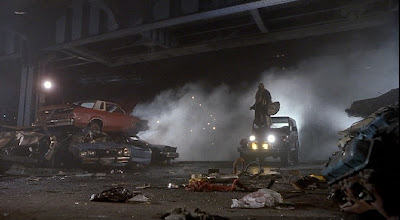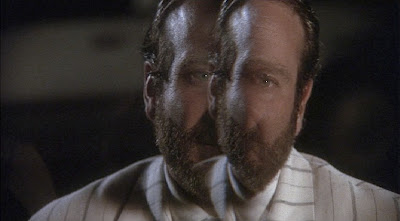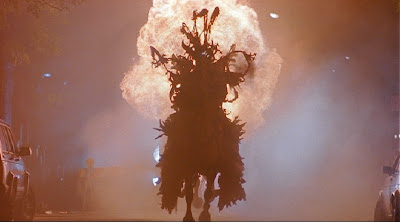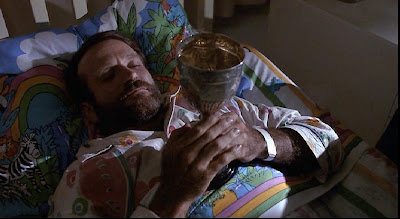
In
The Fisher King, Gilliam sets his manic protagonists loose against the backdrop of New York City. Although somewhat less stylistic than
Brazil,
The Fisher King retains a similar mood at certain points. As in
Brazil, Gilliam makes the city come gruesomely alive, showing an underbelly teeming with malcontents, depressives and basket cases. Jeff Bridges' Jack Lucas becomes entangled with these people and discovers that he is not any more sane than they are underneath his sardonic veneer. Though desperate, they live by their impulses, outside the constraints of New York society.

What I sort of like about this film is that underneath all the elements that make it definitively Gilliam, it is a pretty recognizable narrative about redemption, with elements of romantic comedy thrown in. There is also some cosmic, religious subtext. Gilliam manages to warp a fairly conventional genre until it is unrecognizable, and completely enthralling. It doesn't hurt that the film is supported by incredible performances.


Jack begins the film as a powerful and privileged radio personality. As such, he is totally distanced from the people who call into his show, as well as everyone else. In his studio, the camera gazes on him bleakly from the top of a dark room, where he sits isolated in the darkness. When his ironic advice leads to a devastating act of violence, he plummets from his insulated world into the banal workaday life occupied by everyone else, including his girlfriend Anne (Mercedes Ruehl). Once he really hits rock bottom, he gets overly intoxicated and ends up encircled by a banshee circus of homeless men. The point of view camera has a surreal effect, allowing Jack to briefly access a piece of the alternate world that these people occupy. There he meets Parry, a man who believes himself to be a knight on a mission to retrieve the Holy Grail from Manhattan.

Still wracked with guilt, Jack finds himself using Parry to exculpate himself. At this outset, this seems to be more of a selfish motive than anything else, but gradually, he develops true feelings for Parry, whose somewhat vacant faculties provide him with a childlike benevolence. Jack begins by offering Parry some money, and eventually progresses to intervening in his love life, aiding him in landing the girl he has loved from afar (Amanda Plummer). Still, Gilliam doesn't make it that easy for his characters. While Jack is endeavoring to help Parry however he can, he nearly abandons Anne. As soon as he has done what he can for Parry, alleviating himself of the burden of his guilt, he decides to leave her.


There are many obvious similarities to
Brazil, particularly Parry's (Robin Williams) vivid nightmare hallucinations of a fiery red knight--a figment that has replaced the devastating memories of his past. There is a chilling scene when these repressed memories suddenly return. Parry and the audience are confronted with full force as memory, nightmare and reality are interwoven into a cacophonous barrage of imagery.

This film is guided by the negotiation between fate and entropy, but it touches on so many different ideas that it is kind of hard to pick just one. It is an outlandish film with an outlandish plot, but Gilliam keeps it grounded in reality, perhaps through his assertion that insanity is latent within all of us, just a little below the surface. The most convincing characters in this film are the ones that shed their exteriors and play out their wildness.
 In The Fisher King, Gilliam sets his manic protagonists loose against the backdrop of New York City. Although somewhat less stylistic than Brazil, The Fisher King retains a similar mood at certain points. As in Brazil, Gilliam makes the city come gruesomely alive, showing an underbelly teeming with malcontents, depressives and basket cases. Jeff Bridges' Jack Lucas becomes entangled with these people and discovers that he is not any more sane than they are underneath his sardonic veneer. Though desperate, they live by their impulses, outside the constraints of New York society.
In The Fisher King, Gilliam sets his manic protagonists loose against the backdrop of New York City. Although somewhat less stylistic than Brazil, The Fisher King retains a similar mood at certain points. As in Brazil, Gilliam makes the city come gruesomely alive, showing an underbelly teeming with malcontents, depressives and basket cases. Jeff Bridges' Jack Lucas becomes entangled with these people and discovers that he is not any more sane than they are underneath his sardonic veneer. Though desperate, they live by their impulses, outside the constraints of New York society. What I sort of like about this film is that underneath all the elements that make it definitively Gilliam, it is a pretty recognizable narrative about redemption, with elements of romantic comedy thrown in. There is also some cosmic, religious subtext. Gilliam manages to warp a fairly conventional genre until it is unrecognizable, and completely enthralling. It doesn't hurt that the film is supported by incredible performances.
What I sort of like about this film is that underneath all the elements that make it definitively Gilliam, it is a pretty recognizable narrative about redemption, with elements of romantic comedy thrown in. There is also some cosmic, religious subtext. Gilliam manages to warp a fairly conventional genre until it is unrecognizable, and completely enthralling. It doesn't hurt that the film is supported by incredible performances.
 Jack begins the film as a powerful and privileged radio personality. As such, he is totally distanced from the people who call into his show, as well as everyone else. In his studio, the camera gazes on him bleakly from the top of a dark room, where he sits isolated in the darkness. When his ironic advice leads to a devastating act of violence, he plummets from his insulated world into the banal workaday life occupied by everyone else, including his girlfriend Anne (Mercedes Ruehl). Once he really hits rock bottom, he gets overly intoxicated and ends up encircled by a banshee circus of homeless men. The point of view camera has a surreal effect, allowing Jack to briefly access a piece of the alternate world that these people occupy. There he meets Parry, a man who believes himself to be a knight on a mission to retrieve the Holy Grail from Manhattan.
Jack begins the film as a powerful and privileged radio personality. As such, he is totally distanced from the people who call into his show, as well as everyone else. In his studio, the camera gazes on him bleakly from the top of a dark room, where he sits isolated in the darkness. When his ironic advice leads to a devastating act of violence, he plummets from his insulated world into the banal workaday life occupied by everyone else, including his girlfriend Anne (Mercedes Ruehl). Once he really hits rock bottom, he gets overly intoxicated and ends up encircled by a banshee circus of homeless men. The point of view camera has a surreal effect, allowing Jack to briefly access a piece of the alternate world that these people occupy. There he meets Parry, a man who believes himself to be a knight on a mission to retrieve the Holy Grail from Manhattan. Still wracked with guilt, Jack finds himself using Parry to exculpate himself. At this outset, this seems to be more of a selfish motive than anything else, but gradually, he develops true feelings for Parry, whose somewhat vacant faculties provide him with a childlike benevolence. Jack begins by offering Parry some money, and eventually progresses to intervening in his love life, aiding him in landing the girl he has loved from afar (Amanda Plummer). Still, Gilliam doesn't make it that easy for his characters. While Jack is endeavoring to help Parry however he can, he nearly abandons Anne. As soon as he has done what he can for Parry, alleviating himself of the burden of his guilt, he decides to leave her.
Still wracked with guilt, Jack finds himself using Parry to exculpate himself. At this outset, this seems to be more of a selfish motive than anything else, but gradually, he develops true feelings for Parry, whose somewhat vacant faculties provide him with a childlike benevolence. Jack begins by offering Parry some money, and eventually progresses to intervening in his love life, aiding him in landing the girl he has loved from afar (Amanda Plummer). Still, Gilliam doesn't make it that easy for his characters. While Jack is endeavoring to help Parry however he can, he nearly abandons Anne. As soon as he has done what he can for Parry, alleviating himself of the burden of his guilt, he decides to leave her.
 There are many obvious similarities to Brazil, particularly Parry's (Robin Williams) vivid nightmare hallucinations of a fiery red knight--a figment that has replaced the devastating memories of his past. There is a chilling scene when these repressed memories suddenly return. Parry and the audience are confronted with full force as memory, nightmare and reality are interwoven into a cacophonous barrage of imagery.
There are many obvious similarities to Brazil, particularly Parry's (Robin Williams) vivid nightmare hallucinations of a fiery red knight--a figment that has replaced the devastating memories of his past. There is a chilling scene when these repressed memories suddenly return. Parry and the audience are confronted with full force as memory, nightmare and reality are interwoven into a cacophonous barrage of imagery. This film is guided by the negotiation between fate and entropy, but it touches on so many different ideas that it is kind of hard to pick just one. It is an outlandish film with an outlandish plot, but Gilliam keeps it grounded in reality, perhaps through his assertion that insanity is latent within all of us, just a little below the surface. The most convincing characters in this film are the ones that shed their exteriors and play out their wildness.
This film is guided by the negotiation between fate and entropy, but it touches on so many different ideas that it is kind of hard to pick just one. It is an outlandish film with an outlandish plot, but Gilliam keeps it grounded in reality, perhaps through his assertion that insanity is latent within all of us, just a little below the surface. The most convincing characters in this film are the ones that shed their exteriors and play out their wildness.

No comments:
Post a Comment